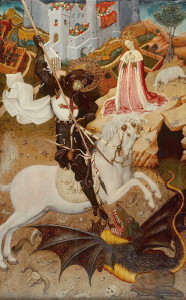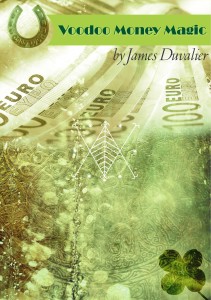"It is the eve of St. George's Day. Do you not know that tonight, when the clock strikes midnight, all the evil things in the world will have full sway?" -Bram Stoker's Dracula
 As the weather becomes warmer and the trees and flowers start to bloom I inevitably think of the feast of St. George which according to a popular Romanian legend is the day when the saint opens the door to summer. St. Andrew’s Day, of which I have blogged previously, is the day in which St. Andrew opens the door to winter. Curiously the eve before both of these holy days is associated in many Eastern European countries with witchcraft and heightened supernatural activity. According to the Gregorian calendar, the feast of St. George falls on the 23rd of April and according to the Julian calendar still used by many Eastern Orthodox Churches the saint’s day falls on 5th of May. In his famous novel Dracula, Bram Stoker makes mention of St. George’s Eve in the following passage:
As the weather becomes warmer and the trees and flowers start to bloom I inevitably think of the feast of St. George which according to a popular Romanian legend is the day when the saint opens the door to summer. St. Andrew’s Day, of which I have blogged previously, is the day in which St. Andrew opens the door to winter. Curiously the eve before both of these holy days is associated in many Eastern European countries with witchcraft and heightened supernatural activity. According to the Gregorian calendar, the feast of St. George falls on the 23rd of April and according to the Julian calendar still used by many Eastern Orthodox Churches the saint’s day falls on 5th of May. In his famous novel Dracula, Bram Stoker makes mention of St. George’s Eve in the following passage:
“Do you know what day it is?” I answered that it was the fourth of May. She shook her head as she said again: “Oh, yes! I know that, I know that! but do you know what day it is?” On my saying that I did not understand, she went on: “It is the eve of St. George’s Day. Do you not know that tonight, when the clock strikes midnight, all the evil things in the world will have full sway?”
In contrast to St. Andrew’s Eve which is seen as a night to practice divination and to employ all sorts of charms against evil forces, St. George’s Day is also known as a particularly lucky day to perform love magic. This is true throughout many countries where the saint is venerated. This is perhaps due to the warm spring weather that inspires such feelings of love and also to a medieval legends regarding St. George that portrays him as a romantic hero.
It is said about St. George that little is known of him but much is owed to him. According to an early Roman martyrology, St. George was born in what is today Syria to Christian parents, yet he served in the Roman army under the pagan Emperor Diocletian. When it was discovered that St. George was a Christian, the Emperor tried to convince him to convert to paganism by offering him many lavish and expensive gifts. Diocletian had taken a strong liking to George and wanted him to remain in his service, but George remain steadfast in his faith and refused to worship the pagan Roman gods and thereby suffered martyrdom under the Diocletian who reluctantly put him to death. Another one of my favorite saints, St. Barbara also suffered martyrdom under the Emperor Diocletian as did many other fervent Christians. The date of St. George’s martyrdom is recorded as 23 April which remains his feast day today.
According to a popular medieval legend, in the region of Cappadocia there was a princess who was held captive by an angry dragon in a tower. St. George slew the Dragon thereby freeing the Princess and taking on the role of romantic hero. Due to this legend, in eastern Spain, especially in the region of Catalonia, St. George’s Day is celebrated much like Valentine’s Day in other parts of the world where flowers are exchanged among lovers and friends. There also exists the tradition of sharing books on St. George’s Day, although this tradition is not nearly as ancient as the giving of flowers dating only to the early 20th century as a tradition commemorating the deaths of two literary giants Miguel de Cervantes and William Shakespeare who coincidentally died on the evening and the day of the feast of St. George respectively in 1616.
There is no obvious explanation as to the correlation between St. George and heightened supernatural activity that exists in Eastern European folklore. I can only hypothesize that this association comes from the legend regarding St. George slaying the Dragon which in a way enshrines him as a warrior and protector against evil and dangerous forces. Whatever the case, it is never a bad thing to pray to a saint and seek his or her love and protection. May St. George protect watch over and guide us!
I thank you for taking the time to check out my blog and I wish you happiness and abundant blessings!
James Duvalier’s Voodoo Money Magic
I am pleased to announce the publication of my latest ebook entitled Voodoo Money Magic, available on amazon.com and free with the purchase of any service during the month of April. I hope you enjoy and find the information of use!
Voodoo Money Magic

Herbal Spiritual Cleansing Bath
 I have blogged before about the simple salt water bath cleansing which is all honestly should be enough to rid you of all bad luck and negativity, but several people have come to me who feel that their bad luck is persistent over a long period of time and may be effecting other family members and that a simple salt water cleanse in not enough. I have decided to share a more heavy duty type of cleansing involving a bath of bitter herbs being performed over the course of three nights. Such a cleansing is common among those who practice Santeria and Espiritismo and is often undergone before any major initiation. This cleansing will also neutralize any witchcraft that may have been done on a person and detach any negative spirits or entities that may have attached themselves to a person. You in effect will be starting over fresh with a completely clean slate after taking this spiritual bath. You may also wish to reserve some of the herbal liquid to mop your floors. Think of it as a spiritual bath for your entire home. The following herbs I will list are known as bitter herbs, not because of their taste, but because of their spiritual vibrations which nullify any other spiritual forces that may be at play around you. The names of the herbs are given in Spanish, as that is how they are normally sold. They can be purchased in most botanicas or online spiritual shops. If you are unable to find them, please contact me at james.duvalier@gmail.com and I can send you a prepared herbal bath. In order to prepare this cleansing bath, choose any three of the follow herbs:
I have blogged before about the simple salt water bath cleansing which is all honestly should be enough to rid you of all bad luck and negativity, but several people have come to me who feel that their bad luck is persistent over a long period of time and may be effecting other family members and that a simple salt water cleanse in not enough. I have decided to share a more heavy duty type of cleansing involving a bath of bitter herbs being performed over the course of three nights. Such a cleansing is common among those who practice Santeria and Espiritismo and is often undergone before any major initiation. This cleansing will also neutralize any witchcraft that may have been done on a person and detach any negative spirits or entities that may have attached themselves to a person. You in effect will be starting over fresh with a completely clean slate after taking this spiritual bath. You may also wish to reserve some of the herbal liquid to mop your floors. Think of it as a spiritual bath for your entire home. The following herbs I will list are known as bitter herbs, not because of their taste, but because of their spiritual vibrations which nullify any other spiritual forces that may be at play around you. The names of the herbs are given in Spanish, as that is how they are normally sold. They can be purchased in most botanicas or online spiritual shops. If you are unable to find them, please contact me at james.duvalier@gmail.com and I can send you a prepared herbal bath. In order to prepare this cleansing bath, choose any three of the follow herbs:
Anamú
Rompezaragüey
Arasa con todo
Escoba amarga
Espanta muerto
Yerba Bruja
Abre camino
Divide the herbs into three parts and on the first night boil 1/3 of the herbs in a large pot of water. Cool, strain and add to a tub of warm bath water. Bathe for as long as you’d like, but make sure you wet yourself completely. After emerging from the bath, light a small white candle and pray the Our Father and read the 91st psalm. Repeat the same process for two more nights. After you have completed the last bath, you can consider yourself completely renewed and spiritually reborn. You are completely and totally spiritually clean. You may want to bless yourself with some holy water for protection and burn a luck drawing candle to immediately draw some luck into your life.
Again, I will stress that this type of cleansing is quite powerful and is rarely necessary, but since people have asked for it, I am happy to share it here. Thank you for taking the time to visit my blog. I wish you peace, happiness and abundant blessings!
Psychic Sludge: A Common Problem with an Easy Solution
"Psychic sludge is stagnant energy that creates blockages and prevents good luck from flowing in our lives."
 Often times whenever people go through a period of prolonged bad luck or misfortune, their first reaction is to think that they have been cursed or have fallen victim to the evil eye or a malevolent spiritual attachment. I have seen this time and time again in my 20 years of practice as a Voodoo priest and spiritual worker. I have consulted with several hundred people at least and often the first statement out of their mouth is “I’m cursed.” I can honestly say in all my years as a spiritual worker I have only run into a less and a dozen cases where a client has been legitimately cursed and of course I offered a solution in those cases as well. Placing a curse on somebody is much rarer than most people think. The questions arises then-what is the cause of all of this unusual misfortune? The answer is simple: Psychic Sludge! I have an interesting story regarding where I first learned this usful and accurately descriptive term.
Often times whenever people go through a period of prolonged bad luck or misfortune, their first reaction is to think that they have been cursed or have fallen victim to the evil eye or a malevolent spiritual attachment. I have seen this time and time again in my 20 years of practice as a Voodoo priest and spiritual worker. I have consulted with several hundred people at least and often the first statement out of their mouth is “I’m cursed.” I can honestly say in all my years as a spiritual worker I have only run into a less and a dozen cases where a client has been legitimately cursed and of course I offered a solution in those cases as well. Placing a curse on somebody is much rarer than most people think. The questions arises then-what is the cause of all of this unusual misfortune? The answer is simple: Psychic Sludge! I have an interesting story regarding where I first learned this usful and accurately descriptive term.
Back in the 90’s I used to hang around quite bit in spiritual shop in Greenfield, Massachusetts and chat about various metaphysical and occult topics the store’s owner Joanne. One day, I was browsing through the shelves and I heard a woman at the front counter ask Joanne if she thought she was cursed and what she needed to do to end her stretch of bad luck. Joanne laid down a quick spread of tarot cards and informed the woman that she was not cursed in any way nor was she a victim of the evil eye. She was simply covered in psychic sludge, a condition which is quite easy to remedy. My ears perked up at hearing the term “psychic sludge” and of course once the woman had left I asked Joanne what it was. Her explanation made perfect sense to me and on an intuitive level I had already known about psychic sludge but simply lacked the term in my vocabulary.
Psychic sludge is simply a buildup of stagnant energy that can create blockages and prevent good luck and positive change from flowing in our lives. Throughout our daily lives we are bombarded by energies, thoughts, feelings, emotions, stress-our own and those of others. Over time this can stick to us and cause us to feel weighed down, sluggish and can manifest in a lack of progress or prolonged periods of bad luck in our lives. The sludge itself is not negative or positive, just excess stagnant energy that prevents things from flowing in our lives. A buildup of psychic sludge can also weaken our powers in terms of spell casting and manifesting goals in our lives and leave us more vulnerable to spiritual attack by negative entities. Nine times out of ten this is what people experience when they believed they are cursed. Fortunately, the remedy to this condition is quite simple. In order to eliminate psychic sludge, it is a good idea to perform a simple spiritual cleansing at least once a month and certainly before beginning any type of spell, ritual or spiritual exercise. The simplest way to accomplish this is to take a salt water bath. Salt is a great neutralizer. It takes away psychic sludge and all negativity and bad luck caused thereby and even chases away chaotic or harmful spirits. Many cultures and religions even use salt in exorcism rituals.
Start by adding an entire box of salt to a tub full of water and soak as you normally would. Stay as long as you’d like in the bathtub and make sure that you submerge yourself completely or at least pour some of the salt water over your head. Before leaving the tub, say a quick prayer, for example: With this salt water bath, I cleanse away all psychic sludge, bad luck and negativity and open myself psychically and spiritually. I am powerful and spiritually clean! This is just an example, you may use any words you’d like or if there is a prayer appropriate to your religious or spiritual beliefs, you may use it. If you don’t have a bath or prefer showers, you can simply stand in the running shower and scrub yourself with handfuls of salt and as the shower washes the salt away, recite the prayer.
Performing this simple exercise monthly, I personally do it on the last day of every month, will make a huge difference in terms of creating balance and positivity in your life. I hope this information has been useful and I wish you happiness and abundant blessings!
Martisor: A Celebration of Spring with Pagan Origins
Throughout history, many cultures have held festivals and observances to mark the changing of the seasons. Such was the norm millennia ago in pre-Christian Europe as can be seen in the beliefs and practices of Wicca which is a modern manifestation of ancient nature based religions. Other festivals were adopted by the Christian church and incorporated into such major holidays and Christmas, Easter and All Saints’ Day while other observances remained very much a local matter and exist today in a modified form as local folk festivals. One such holiday is Martisor or Martenitsa and is celebrated on March 1st in Romania and Bulgaria as a day of love, friendship and anticipation for the coming spring.
Martisor or Martenitsa as the 1st of March is known in Romania and Bulgaria respectively is an ancient holiday that heralds the coming of spring. The origins of Martisor are obscure and anthropologists speculate that it could have its roots in both Roman and Dacian practices. The Dacian people were the original inhabitants of what is today Romania until they were conquered and integrated into the Roman Empire in the 1st Century AD. Very little remains of their culture and language, except a few words that have found their way into modern Romanian which is Romance language descending from Latin. It is possible that Martisor and its Bulgarian counterpart Martenitsa have their origins in an ancient Dacian celebration welcoming the early spring. It is also worth mentioning that the 1st of March was the Roman New Year and a time to honor Mars, the god of war, so one could draw the conclusion that Martisor is a fusion of ancient Roman and Dacian practices.
Curiously, unlike many ancient Pagan celebrations, Martisor was never fully Christianized but survived into modern times as a lighthearted celebration of spring, love and friendship. In Romanian and Bulgarian folklore there are legends that speak of a Mother Earth spirit named Baba Dochia (Romanian) and Baba Marta (Bulgarian) that is particularly active during this time, which could indicated that Martisor originated as an ancient festival honoring the local manifestation of the Mother Earth Goddess. Today in Romania it is traditional to give little metallic charms, often in the shape of birds or other animals, tied with a braided red and white string. It is also customary to give red and white flowers to loved ones. In Bulgaria, there exists a tradition of tying a red and white bracelet made of braided string around one’s wrist on the 1st of March and making a wish. The bracelet is word until one sees a budding tree at some point in March and the bracelet is left on the tree. I lived for years in a college town in Massachusetts where there are several Bulgarian students and I remember one spring seeing many red and white ribbons hanging from trees on campus.
If you would like to access the happy, positive energy associated with Martisor, wearing a red and white string bracelet on the 1st of March would be a good way to do so. You could also light a white and red candle and meditate on what positive changes you’d like to create in the upcoming spring and summer months and as Martisor is an Earth festival, remember to thank the Earth for all the blessings and sustenance she has provided for you and give thanks to God, the Ancestors and Saints always!
I hope you have enjoyed learning about Martisor and I hope the upcoming spring brings you abundant blessings and much happiness!

